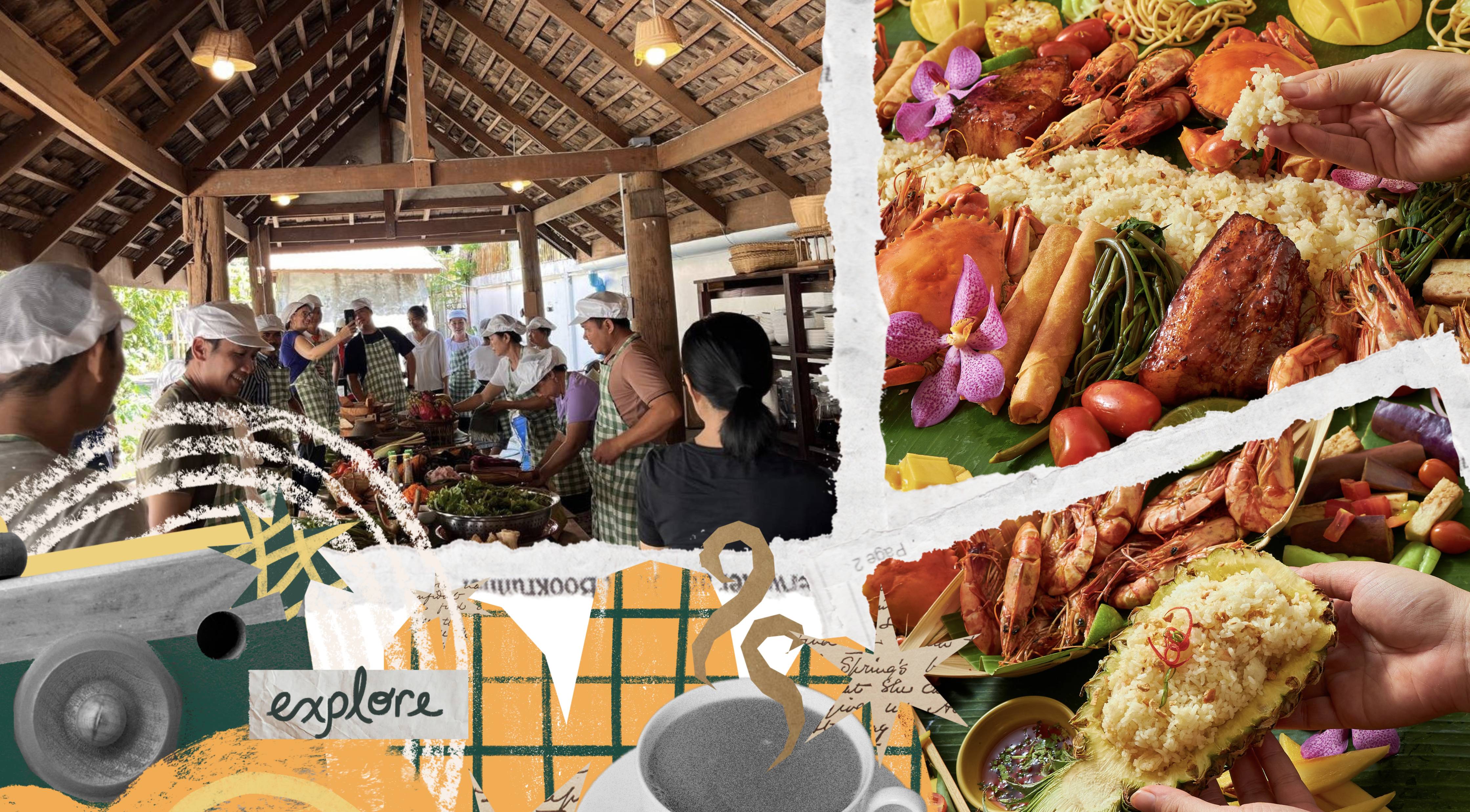
Background
The ASEAN region is renowned for its tourism and culinary offerings, with picturesque landscapes and diverse food experiences. However, this growth has led to environmental concerns, urging a shift towards a circular economy model. The tourism sector contributes significantly to greenhouse gas emissions, waste generation, and natural resource depletion. Nevertheless, tourism can play a crucial role in reducing food waste and promoting sustainability within the food industry. Hospitality businesses are increasingly adopting strategies like food waste audits and surplus food distribution to minimise waste. By emphasising local supply chains, tourism supports local food systems and cultural preservation. Overall, tourism serves as a catalyst for reforming food systems towards sustainability and circularity, promoting resilience, equity, and environmental stewardship.
 Key Takeaways
Key Takeaways
These key takeaways from the webinar offer a comprehensive overview of the strategies and opportunities for food circularity in the tourism sector:
- Opportunity for Sustainability: With the tourism industry reaching pre-pandemic levels, there's a prime opportunity to transition towards sustainability in the sector, particularly focusing on food sustainability through circular practices.
- Importance of SCP and Circular Economy: Sustainable Consumption and Production (SCP) and circular economy principles are crucial in minimising negative environmental impacts across the entire food value chain in tourism and promoting resource-efficient practices.
- Tourism's Role in Food Systems: Tourism significantly impacts food systems, influencing both production and consumption patterns. Tackling food loss and waste is imperative for transforming food systems within the tourism sector.
- Multi-Stakeholder Collaboration: Addressing food circularity in tourism requires comprehensive collaboration among multi-stakeholders, including businesses, policymakers, and local communities.
- Importance of Metrics: Metrics play a crucial role in assessing progress and identifying areas for improvement. Managing food waste data and establishing metrics are essential for effective decision-making.
- People-Driven Transition: The success of circular tourism practices depends on people's understanding and appreciation of the transition towards circularity in the food sector. This highlights the importance of community engagement and education in driving sustainable practices. There is also a need to strengthen linkages between tourism businesses and local producers creating local economic development opportunities for communities in tourism destinations.
- Awareness and Education: Raising awareness among stakeholders about the economic, social, and environmental benefits of sustainability is crucial for driving adoption of circular practices in tourism.
- Capacity Building for SMEs: Capacity building programmes for small and medium-sized enterprises (SMEs) are vital for enhancing their sustainability practices and competitiveness in the tourism industry.
- Cultural Foundations: Leveraging cultural values and traditions that emphasise resourcefulness and waste reduction can foster sustainable practices within the ASEAN region's tourism sector.
- Embracing Asian Values: Recognising and promoting cultural heritage and values, such as the tradition of minimal waste, is key to fostering sustainability within the ASEAN region. These values can guide business practices and promote responsible consumption.
- Knowledge Sharing Platforms: Collaboration at regional and international levels through various platforms can facilitate knowledge exchange and best practice sharing for sustainable development in the tourism sector.
- Support from Governments and International Organisations: Collaboration between governments, international organisations, and the hospitality industry is crucial for promoting sustainability initiatives. Support from these entities can facilitate the implementation of sustainable practices and initiatives within the sector.
- Importance of Standards and Policies: Establishing standards and policies is crucial for guiding businesses and ensuring sustainability in the tourism sector. Policies at regional and international levels play a significant role in enabling the adoption of sustainable practices.
- Innovative Solutions: Innovative solutions such as closed buffets, food waste tracking technologies, and community-driven initiatives play a crucial role in reducing food waste and promoting sustainability in tourism.
Introduction
Over the years, ASEAN countries have experienced significant growth in their tourism and food sectors, contributing to their economies and fostering regional integration. However, mirroring a global trend, this expansion has been accompanied by an environmental footprint, highlighting the urgent need for the region to transform its food and tourism sectors towards a circular economy model.
The tourism sector, encompassing transportation, accommodation, amenities, and attractions, is responsible for 8% of greenhouse gas emissions, 4%-8% of waste generation, and significantly contributes to nature disturbance, land and coastal degradation, habitat destruction, littering, pollution, and the depletion of other natural resources.
Tourism plays an important role in reducing food waste and advancing food circularity, thereby aiding the transition to more sustainable and resilient food systems worldwide. It intersects with numerous aspects of food production, distribution, consumption, and waste management. By leveraging its potential, tourism can significantly impact efforts to decrease food waste and promote circularity within the food industry.
Furthermore, tourism encourages sustainable food practices among hospitality firms. Hotels, resorts, and restaurants are increasingly recognising the importance of reducing food waste to enhance their environmental impact, save costs, and attract eco-conscious guests. Strategies such as food waste audits, portion control, and menu optimisation help these entities minimise excess food production and disposal. Moreover, composting and recycling programmes help divert organic waste from landfills, enhancing circularity by reintegrating nutrients into the soil.
In addition to waste reduction, tourism facilitates food circularity by distributing surplus food to those in need and sourcing more sustainable inputs. Numerous tourism businesses engage in food recovery initiatives, partnering with local food banks, shelters, and humanitarian organisations to distribute excess food that would otherwise go to waste. These efforts not only address food scarcity but also promote social equity and solidarity within destination communities. By redistributing surplus food to feed underprivileged groups, tourism fosters a more inclusive and compassionate approach to food management.
By emphasising local supply chains, tourism bolsters local food systems, significantly contributing to waste reduction. Tourists often seek authentic culinary experiences, driving demand for locally sourced and traditional dishes. This demand encourages restaurants, hotels, and food vendors to prioritise fresh, seasonal, and locally sourced ingredients, thereby supporting local food production practices and economic growth in supplier communities. Reducing reliance on long-distance transportation and large-scale distribution networks, which often result in significant food losses, tourism minimises the environmental impact.
Moreover, culinary tourism promotes cultural exchange and appreciation for diverse food traditions, encouraging local communities to preserve their culinary heritage and traditional food preparation methods. Highlighting indigenous cuisines and culinary techniques, tourism supports the conservation of culinary biodiversity and the sustainable use of local ingredients. This focus on cultural authenticity and gastronomic diversity increases the value of local food systems and strengthens community resilience against homogenised food trends and globalised diets.
Overall, tourism acts as a catalyst for reforming food systems to enhance sustainability and circularity. It plays a crucial role in creating more resilient, egalitarian, and environmentally sustainable food systems by encouraging local food procurement, minimising food waste, preserving culinary heritage, and strengthening community resilience. As the tourism sector evolves, the adoption of ethical food practices will be vital in realising its full potential as a force for positive change in the global food landscape.
The 1.5-hour webinar "The Role of Tourism in Advancing Food Sustainability in ASEAN through Circular Practices," hosted by the ASEAN Circular Economy Stakeholder Platform (ACESP) and co-hosted by the EU SWITCH-Asia Policy Support Component, emphasised on the clear linkages between tourism and the food sector and highlighted on the apparent opportunities for interventions of sustainable food management in hospitality.
The event began with a welcome note and an overview of the ASEAN Circular Economy Stakeholder Platform, highlighting its role in consolidating and facilitating regional efforts. Loraine Gatlabayan, Expert on SCP awareness raising and regional partnership building at the SWITCH-Asia Policy Support Component, presented how the tourism sector has a role in advancing food circularity in ASEAN region and beyond.
Regional tourism and food management practitioners discussed tangible examples of how tourism can be a key actor and a catalyst for better food circularity and help drive innovation which in turns empower community resiliency. The final panel was joined by global practitioners who discussed the specific policy measures in the agri-food sector which helped enable the transformation of ASEAN’s tourism with special focus on SMEs.
This expert discussion culminated in five key questions that need addressing:
- How can the tourism industry transition towards sustainable food practices?
- What collaboration strategies are needed to minimise food waste across the tourism sector?
- How can cultural values be utilised to promote sustainability in ASEAN's tourism?
- What framework is necessary to implement sustainable policies in the tourism industry?
- Which innovative solutions show the most potential in reducing food waste and promoting sustainability in tourism?
ASEAN Circular Economy Stakeholder Platform
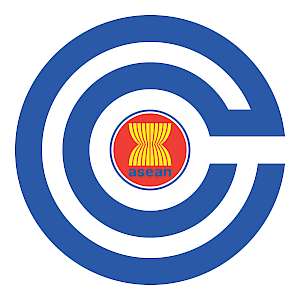
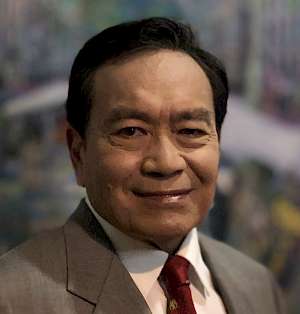
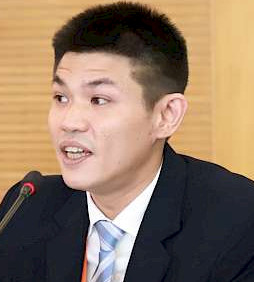 Anthony Pramualratana and Treesuvit (David) Arriyavat, Deputy Director and Project Manager respectively at the ASEAN Circular Economy Stakeholder Platform (ACESP) gave a welcome note on how the tourism industry should be at the forefront in promoting and practicing sustainable consumption and production (SCP). The cultural exchange, local traditions, cultural heritage, traditional practices, and community resilience are essential as we strive towards SCP practices especially within ASEAN countries, where the ASEAN Circular Economy Stakeholder Platform (ACESP), was established as a regional facility to help ASEAN Member States to achieve SCP by accelerating the transition toward a circular economy. It is an ongoing ASEAN-EU partnership on circular economy since 2019, and the establishment of the platform was inspired by the success of the European Circular Economic Sector Platform. By learning from the EU platform and other regional initiatives, ACESP’s mission is to support the transition by providing best practices, strategies, and knowledge by being an information portal, facilitate stakeholder engagement and organising annual conferences with diverse participation such as this webinar.
Anthony Pramualratana and Treesuvit (David) Arriyavat, Deputy Director and Project Manager respectively at the ASEAN Circular Economy Stakeholder Platform (ACESP) gave a welcome note on how the tourism industry should be at the forefront in promoting and practicing sustainable consumption and production (SCP). The cultural exchange, local traditions, cultural heritage, traditional practices, and community resilience are essential as we strive towards SCP practices especially within ASEAN countries, where the ASEAN Circular Economy Stakeholder Platform (ACESP), was established as a regional facility to help ASEAN Member States to achieve SCP by accelerating the transition toward a circular economy. It is an ongoing ASEAN-EU partnership on circular economy since 2019, and the establishment of the platform was inspired by the success of the European Circular Economic Sector Platform. By learning from the EU platform and other regional initiatives, ACESP’s mission is to support the transition by providing best practices, strategies, and knowledge by being an information portal, facilitate stakeholder engagement and organising annual conferences with diverse participation such as this webinar.
Revolutionising the Food and Tourism Sector: Insights from the EU SWITCH-Asia Programme
 In this session, Loraine Gatlabayan, provided an overview on the role of tourism in advancing food sustainability through circular practices. The tourism industry has recovered and is reaching its pre-pandemic level. Thus, now is the opportunity to bring the sector towards sustainability. Tourism is a multi and cross-culture, cross-sectoral sector, which means it is well-positioned to promote SCP and circular economy from within to help in advancing food sustainability as we have seen in the global political agenda.
In this session, Loraine Gatlabayan, provided an overview on the role of tourism in advancing food sustainability through circular practices. The tourism industry has recovered and is reaching its pre-pandemic level. Thus, now is the opportunity to bring the sector towards sustainability. Tourism is a multi and cross-culture, cross-sectoral sector, which means it is well-positioned to promote SCP and circular economy from within to help in advancing food sustainability as we have seen in the global political agenda.
SCP aims to minimise the negative environmental impacts from the consumption and production systems. It also considers all stages in the life cycle of the products and services, including in tourism, while promoting quality of life and well-being. Therefore, the whole value chain is examined to look at drivers and barriers to sustainability. It is important to transform the supply chain from production as well as shaping the markets, market demand, and the environmental impacts of consumption.
SCP and circular economy are interlinked as both focus on resource-efficient use and the reduction of waste generation through the production, distribution, transportation, and consumption value chain. This approach highlights the extension of a life cycle of products through sharing, leasing, reusing, repairing, refurbishing, recycling existing materials and products for as long as possible to create further value of the products and services.
The tourism value creation system illustrate that the tourism sector consists of a wide range of businesses from small local operations that serve a single local market to the very large transportation, hotel and tour operator companies that serve the global markets across regions which provide a number of tour packages to foreign destinations. The tourism industry itself provides many products and services, such as accommodations, transport, food and drink, attractions, souvenirs and many others involving multi-stakeholder networks.
The lifecycle approach must be systematically encouraged and promoted for tourism design and implementation to better shift towards SCP and circularity approaches to reduce the ecological footprint of the value chain and improve sustainable management of natural resources and wastes.
Tourism has an important role to play in advancing sustainable food systems through the application of SCP and circular economy approaches by focusing on reducing resource use, preventing food loss and waste, and redistributing organic resources such as those from food byproducts from the tourism value chain.
Food has significant economic, social, environmental impacts for both the tourist destinations and the tourism businesses. The overuse of this scarce resource, and the excessive production of food waste, coupled with poor working conditions are some examples of the the negative consequences for a destination. Tourism has an influence on the way food is being produced and consumed. Tackling food loss and waste is one concrete action that can be taken to transform the food systems in the tourism sector.
The middle stage of the food value chain has high potential to shape both what farmers produce and sell as well as what consumers buy and eat. Most policy measures address either primary production or individual consumption stages but the middle stages of the value chain can also offer an opportunity for impactful policy measures. Therefore, the reduction of food waste and loss is a key element in advancing a transition towards more sustainable food management in tourism.
The United Nations World Tourism Organisation (UNWTO) analysed national tourism polices for 114 countries worldwide in 2022 and revealed the global trend that 77% of the policies mentioned food as a strategy to improve tourism through the gastronomic experiences, but only 3 policies—from Costa Rica, Nepal, and Vanuatu—included references to all the four stages of sustainable food management—procurement, preparation, consumption, and waste. Additionally, UNWTO published The Global Roadmap for Food Waste Reduction in the Tourism Sector Report last year and detailed how tourism stakeholders could accelerate the uptake of food waste reduction strategies.
Sub-regionally, tourism is recognised as an important driver for economic development, which requires regional cooperation and integration, and the ASEAN has responded to the global trend in addressing the sustainability needs. The ASEAN Tourism Strategic Plan 2016-2025 emphasised the importance of ensuring sustainability, inclusiveness and resiliency of tourism through SCP to Greening the Tourism Value Chain and financing program memes to encourage and promote responsible tourism development in ASEAN and to address food systems in the tourism value-chain.
A Systems thinking approach with comprehensive multi-stakeholder collaboration can support the transition towards circular food systems in the tourism sector. This involves food waste prevention, recovery, and reuse at different stages—food production, processing, distribution, consumption and waste management—by potentially closing the loop resource flow for biological materials. It also involves the promotion of innovative business models and actions that offer tourists local food products while using sustainable packaging which optimises food durability and performance. Innovations in product and service lifecycles through resource efficiency, resource substitution, and resource circularity are also crucial to the transformation. Lastly, market transformation through circular solutions enabled by public policy, sustainable consumption and lifestyles, functioning markets and appropriate financing can better accelerate the uptake of SCP and circular economy strategies.
Panel Discussion: Tourism as Catalyst for Food Circularity
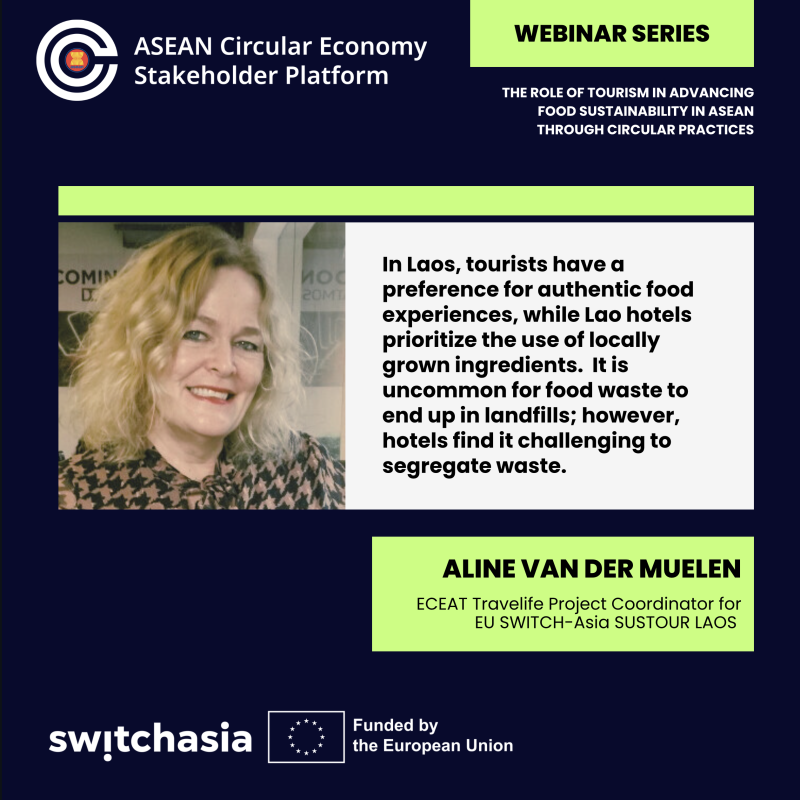
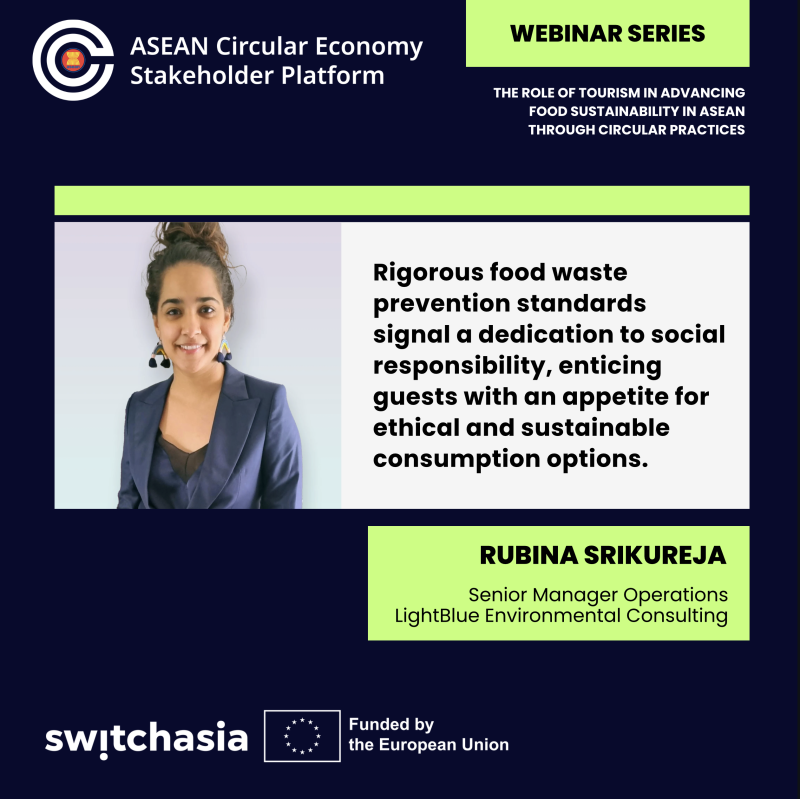
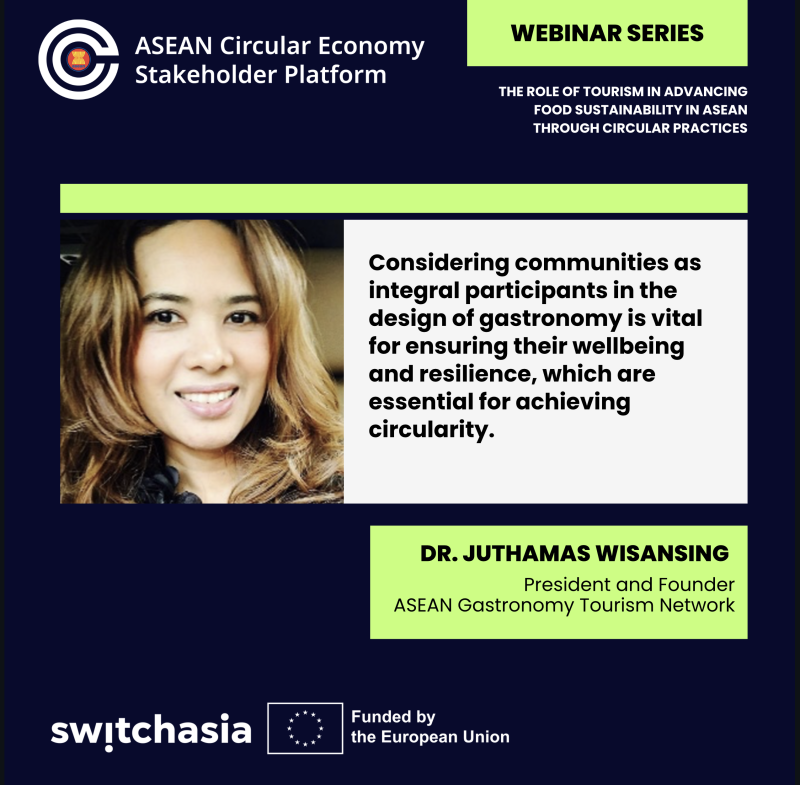
Zinaida Fadeeva, Team Leader at the SWITCH-Asia Policy Support Component, moderated a session on food circularity practices in the tourism sector and began by sharing leading practices from the SWITCH-Asia grant projects. Out of the 33 grant projects supported by the EU, 16 projects work in the tourism sector, and five projects work in ASEAN. Two of the projects operate in Lao PDR, one of which works with SMEs and consumer awareness, and another on destination development. Two of projects operate in Thailand, one of which works on policy measure and certification for supply chain, and another—in Thailand and Philippines— on zero carbon resorts focusing on sustainable, independent, and reliable energy solutions. She also added that the SWITCH-Asia website is a resourceful platform providing interesting cases for sustainability inspirations. ASEAN regional practitioners from Thailand and Lao PDR joined the moderator in the panel to share their experiences from the tourism sector that is focusing on food.
Aline Van Der Muelen, ECEAT Travelife Project Coordinator for EU SWITCH-Asia SUSTOUR LAOS project, shared that she works with hotels in Lao PDR to support them towards Travelife Certification and therefore can offer many good practices currently taking place. Most hotels have fresh fruits and vegetables delivered every day, and those that have enough space would grow their own as they are well aware that most tourists prefer authentic food adventures as revealed by the late famous Chef Anthony Bourdain. Many hotels offer Laos and regional dishes for the sought-after experiences.
Most hotels implement first-in-first-out portion control (FIFO), monitor food waste that were spoilt before preparation, where the waste is used as compost or given to staff members to feed their chickens or composting for their vegetable gardens. It's very rare in Laos to see food waste ending up in a landfill. However, the hotels still have challenges in waste segregation where mistakes tend to happen and contaminated food waste becoming unusable. Apart from capacity building, certification bodies are also supportive in helping to put policies in place such as the requirement for suppliers on how things are to be delivered to the kitchen, and how food should be delivered to consumers.
Rubina Srikureja, Senior Manager Operations at LightBlue Environmental Consulting, shared that she works with the hospitality sector on food waste prevention. There is a growing demand from consumers, industry professionals, and the corporate level for sustainability policies within businesses. This trickles-down to demanding hotels, restaurants, and businesses to request their suppliers to provide innovative solutions related to food and waste.
Monitoring existing food waste leads to impact awareness and tangible progress review of the initiatives implemented within businesses. The Food Intel Tech (FIT) is a combination of an app and a software dashboard to track food waste reduction data and to address the challenges accordingly. Following the data analysis from FIT, recommendations and best practices are then offered. FIT can cover multiple recording points within businesses without requiring new hardware, thus reducing carbon emissions.
The Pledge on Food Waste focuses on food waste prevention as a more holistic approach. It involves the whole team beyond the kitchen or F&B team within the restaurant or hotel and includes marketing, human resources, top management, and finance because every department has a role in this process. Embedding best practices into set criteria creates a uniform process for the entire industry. The criteria has 7 pillars, ranging from raising awareness amongst the staff to monitoring the food waste from the internal kitchen process.
For example, human resources should provide sufficient training to food relevant employees or incoming employees. Finance should track food cost percentage as well as the food cost per cover. Marketing should communicate initiatives both internally and externally to diners so that they too can make an effort in reducing food waste on their plates. The top management should encourage and motivate team membure to ensure the initiatives are transparent. Waste is equivalent to money. We only call it ‘waste’ when it has no purpose. But if we push the boundaries and be creative on how waste can have other purposes, it will create economic values rather than being and environmental burden. Therefore, we must monitor the amount of waste we generate to improve our practices and protecting our economic gain.
Juthamas Wisansing, President and Founder at Thailand Gastronomy Network, elaborated on the importance of circularity practices for positively impacting the community and destinations by understanding the connectivity of all players within the system. The community is a key player in gastronomy designs, and tourists should understand, appreciate and advocate on local communities’ culture and well-being, which is the key to circularity.
The Thailand Gastronomy Network highlights four pillars for community resilience and sustainability movement through food, which are promoting small and medium size organic farmers; appreciating and creating stories of local traditions and; advocating gastro diplomacy on food heritage; and developing sustainable destinations through food waste management by reimagining waste as a resource.
Communities live the regenerative lifestyles by eating seasonal food, adapting their life to nature, and living traditionally with nature. Therefore, communities need to be the key player in the entire system in it’s move towards better resiliency and equity in the food system and tourism industry as a whole.
Panel Discussion: Transforming ASEAN’s Tourism sector through policy measures for circularity in the Agri-food industry
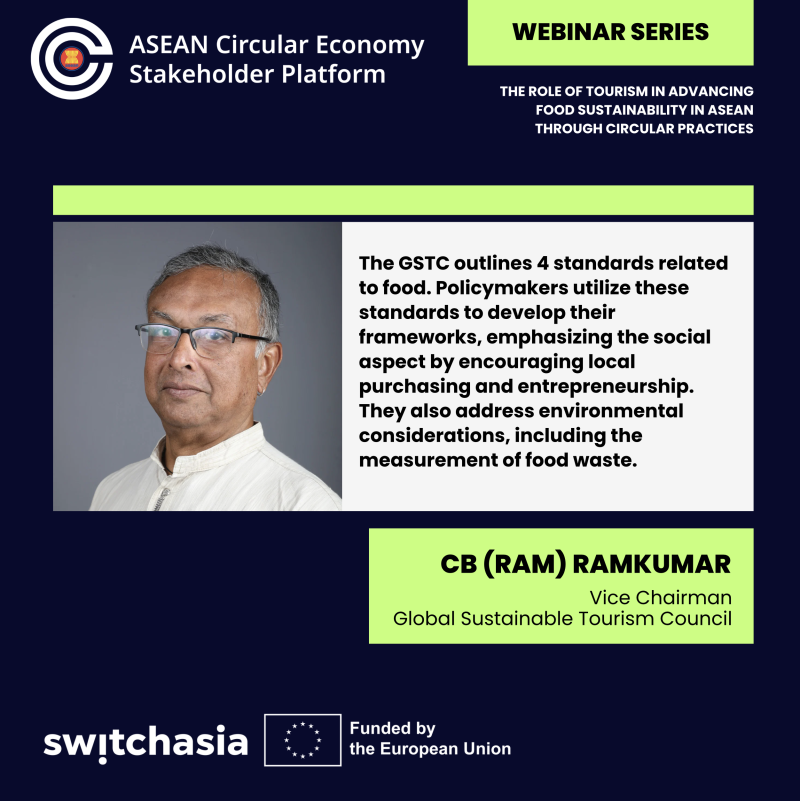
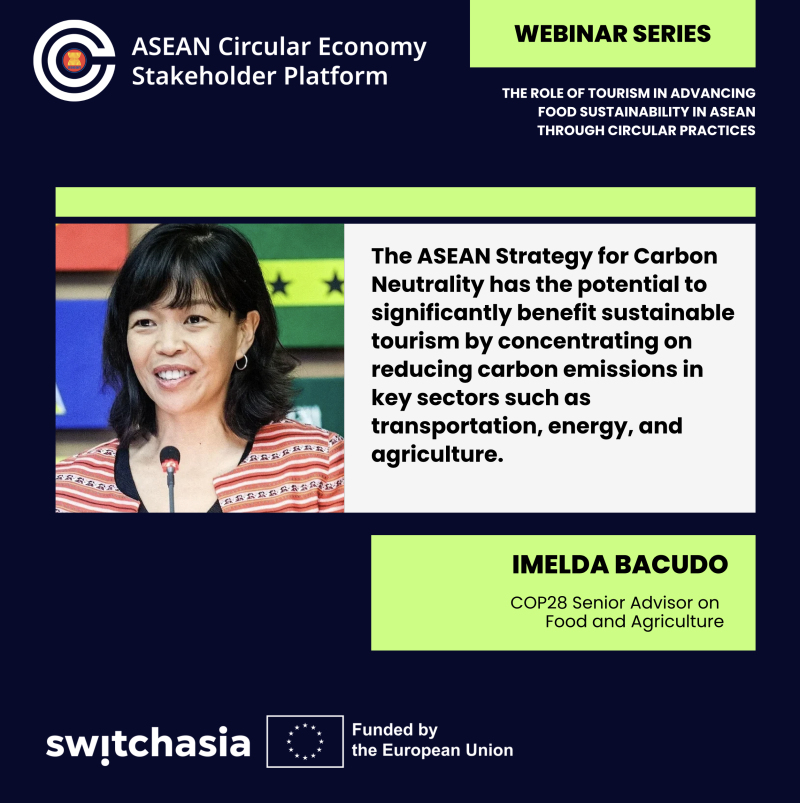
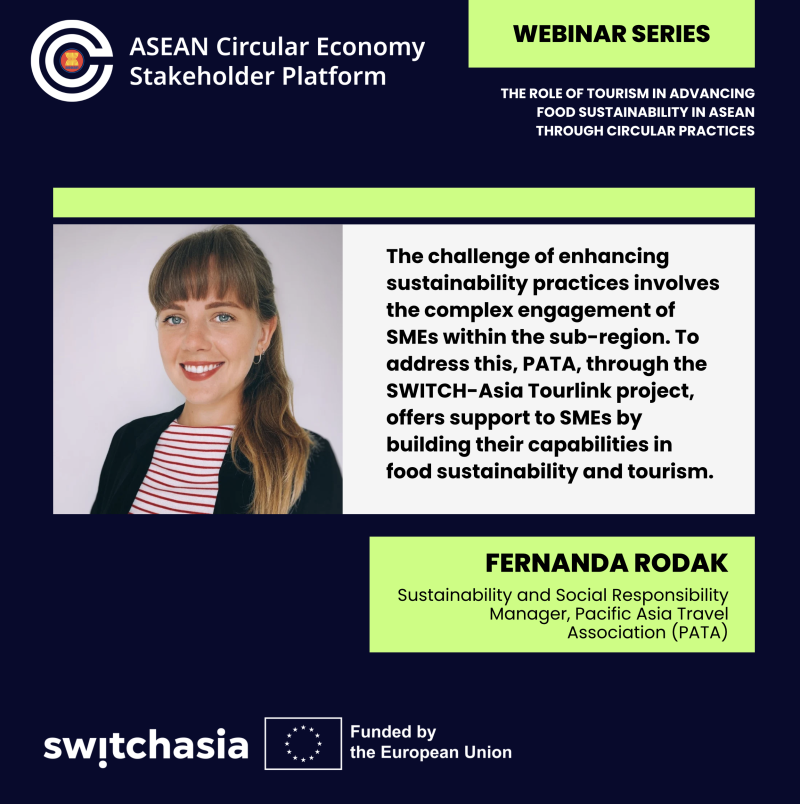
Elodie Maria-Sube, Key Expert on EU policy development and partnership building at the SWITCH-Asia Policy Support Component, moderated the session—which was joined by global practitioners on tourism and food to discuss the policy framework supporting circular food practices in the hospitality sector.
CB (Ram) Ramkumar, Vice Chair at the Global Sustainable Tourism Council (GSTC), introduced the GSTC that was established in 2007 by the United Nations Environment Programme, the United Nations Foundation, and the United Nations World Tourism Organisation to create the much-needed sustainable tourism standards for the planet in part because tourism tends to overconsume resources, which are disproportionate to the value it adds back to the economies. Typically, a guest in a resort consumes 7 - 9 times more water than the surrounding communities. Similarly, the food waste generated by hotel guests can be excessively high.
All tourism policies formed by the governments around the world need these uniform frameworks as a guideline, which is why the GSTC Criteria was developed for hotels, tour operators, destinations, venues, event organisers, and events & exhibitions. Four of the criteria refer to food, of which two cover the social aspects such as encouraging local food products purchasing and supporting local food entrepreneurship, and the other two cover the environmental aspects such as promoting environmentally friendly and traceable food purchasing with less food miles. The last criteria covers food waste management such as putting a system in place to ensure that food waste is measured in its entire production cycle. The GSTC website also offers tools and examples of best practices within the tourism industry.
Innovative solutions to prevent food wastes exist widely and many were earlier mentioned, but most notably to him is the closed buffet. A closed buffet is when guests hand their plates to the staff to serve a portion of food on their plates. It was first introduced during the pandemic to ensure cleanliest and prevent contamination, in this case the staffs were serving food behind glass partitions. This innovation resulted in a 30% food waste reduction, and therefore the hotel continues this practice to this day. This allows chefs to cook less food and have more time to interact with guests getting direct feedback for further improvements. This creative solution not only improves environmental footprints, but also improves social and economic impact as well.
Imelda (Dada) Bacudo, COP28 Senior Advisor on Food and Agriculture, added that her work in sustainable and climate-smart agriculture has many similarities in the tourism sector as both are contributors to greenhouse gas emissions that creates climate change. One of the very important global food policy and high-level declaration, the COP28 UAE Declaration on Sustainable Agriculture, Resilient Food Systems, and Climate Action which was recently endorsed by 159 countries’ head of state, all member states with only the exception of two countries. The declaration reiterated that food and agriculture are being impacted by climate change and offers measures for consolidated and collaborative actions among multi-sectors, including tourism.
Regionally, there are many Asian frameworks and policy guidelines concerning tourism, food security and food systems. Most recently, the ASEAN Strategy for Carbon Neutrality aims to lower emissions in three major sectors: transportation, energy, and agriculture, all things surrounding tourism. The ASEAN region is a fertile ground for circular business initiatives because this region culturally and intrinsically has all the values of circularity instilled within us. Starting from how we were brought up not to waste anything, how rice is sacred and should not be thrown away, how we must learn the value of each part of a product and must utilise all parts of things we harvest. This is a good foundation of our entrepreneurial spirit, how recycling is a business by nature within our culture.
There are also many initiatives and pilot project in tourism, and one of her favourites was using black solder flies to manage food loss and waste, a perfect solution of sustainability and circular economy. Other innovative solutions for food waste prevention include having an observer in place who report on the amount of food waste to event participants to be aware of their impact. Another worth mentioning is having recycled food options offered to guests to take part. These are just some of the examples of how guidelines for the agriculture and food sector can be utilised by the tourism sector.
She also added that the ASEAN Climate Resilience Network (ASEAN-CRN) is a knowledge exchange platform composed of the 10 Member States exchanging on best practices, smart agriculture, resilient food system practices, and many of the approaches that you have mentioned earlier. The network formed the ASEAN Negotiating Group for Agriculture (ANGA) to bring ASEAN issues together.
Fernanda Rodak, Sustainability & Social Responsibility Manager at Pacific Asia Travel Association, highlighted that SMEs make up the vast majority of businesses in ASEAN, which also applies for the tourism industry. They are the essential drivers for economic growth and employment, and tourism is the one of the most important sectors for the ASEAN economy. Therefore, greening the SMEs is paramount to the region's journey towards sustainable development. However, this task will not be easy, especially since the impact of the COVID-19 pandemic. SMEs have been focusing on maintaining their operations and paying salaries with little to no income during the pandemic. Increasing sustainability practices is then viewed as least important in the short-term survival mindset, but rather viewed as something complex that is costly and time consuming. All the more reason that we must raise their awareness on how sustainability can help lower expenses and operating costs in the long-term, while bringing about a competitive advantage. This is because travellers are increasingly aware of their impact on destinations and want to have a positive impact from more sustainable choices.
Capacity building programmes for SMEs is one of the most important measures to support food sustainability in tourism. These also increase access to finance and grants, as well as to new markets and opportunities. PATA works on these programmes, for example the EU SWITCH-Asia Tourlink Project, which focuses on Thailand’s tourism supply chain that are linked to EU consumers and businesses as required by the EU Corporate Sustainability Due Diligence Directive. The project unites expertise from many partner organisations on sustainable tourism to achieve outputs of green finance opportunities, carbon emissions, reduction in tour numbers, human rights, community-based tourism, as well as the Food & Plastic Waste Reduction: Standards for Tourism Businesses. These training programmes and technical resources help equip SMEs with knowledge and skills to innovate and implement sustainable strategies, and also provides them with opportunities to share their knowledge, challenges and lessons learned with other SMEs.
Great ideas and solutions arises from the project such as sourcing organic ingredients locally and regularly , rooftop gardens, creating seasonal menus, farm to table initiatives, joining zero-kilometre food, zero food waste cooking policy, partnering with food surplus distribution organisations and apps, creating composting sites, using black solider flies to decompose organic waste and PATA Waste Free Champion Awards 2023.
- Video recording available here
- Event info at ASEAN Circular Economy Stakeholder Platform and EU SWITCH-Asia
Acknowledgment
This Knowledge Brief was prepared by Dr. Sirasa Kantaratakul, the EU SWITCH-Asia Policy Support Component (PSC) and the ASEAN Circular Economy Stakeholder Platform. The information and contents in this document are the sole responsibility of the authors and do not necessarily reflect the views of the European Union.



